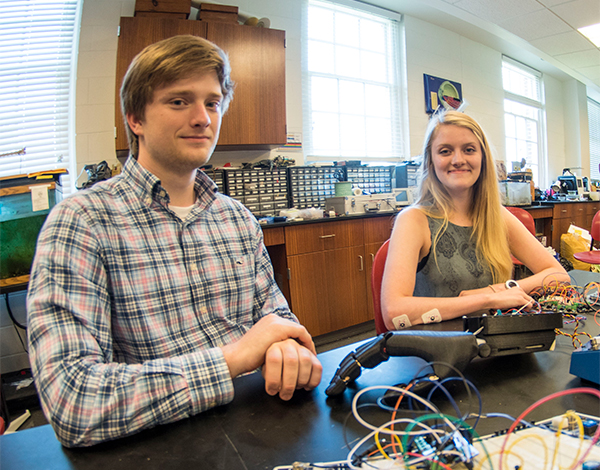Presbyterian College students Andrew Rhodes and Anna Crosby research high-functioning, low-cost 3D printed prosthetics

Presbyterian College students Andrew Rhodes, a junior physics major, from Lugoff, S.C., and Anna Crosby a junior physics major, from Camden, S.C., are spending the summer researching high-functioning, low-cost 3D printed prosthetics.
“The loss of a limb can be a traumatic experience for a person,” they said. “Prosthetics restore functionality and confidence to the user. However, insurance often does not cover the cost of prosthetics, and entry-level prosthetics can cost more than $10,000.”
Rhodes and Crosby designed and built a low-cost, highly-functional, myoelectric controlled, 3D printed prosthetic that can easily be produced by anyone with a 3D printer.
“Using an open-source prosthetic design, we modified the original by adding mounts for servo motors, the battery, and circuitry into the gauntlet,” They said. “We then used the electrical signal from the healthy muscles to naturally control the prosthetic hand.”
Rhodes and Crosby explained that the circuit uses multiple electrodes to differentially measure independent muscle contractions. The contraction signals are compared to a reference point on the elbow where little to no muscle movement is made.
The pair use machine learning to help the controller modify the movement based on user input during a start-up routine. This startup routine learns the user’s muscle habits and modifies variables in the code to make the muscular profile unique to the user.
“Making prosthetics more customizable will help provide affordable prosthetic hands to thousands of adults and children, restoring the functionality of their hands and their confidence.”
Rhodes is a member of Alpha Sigma Phi and works with the physics department.
Crosby is treasurer of Sigma Sigma Sigma and president of the Chinese Club.
“This research is exactly why I joined the physics department here,” Crosby said. “Prosthetic design and engineering is a subject I’ve been fascinated with throughout school.”
The PC Summer Fellows Program is designed to enhance the academic experience of PC students by providing them with opportunities to work with faculty during the summer. The program is intended for motivated students to gain research experience with direct faculty mentoring. Students experience the process of research as a creative intellectual activity in a living-learning environment.
Presbyterian College is located on a striking 240-acre campus in Clinton, between Columbia and Greenville, S.C. Offering challenging academics and a culture of honor, ethics, and service that prepares students to be leaders in communities, PC offers its students the benefit of engaging with an exceptional faculty who take individual interest in their students’ well-being, both personally and in the classroom. The Presbyterian College School of Pharmacy is dedicated to the ideals of leadership, honor to the profession, and service to the community. For more information about Presbyterian College, visit www.presby.edu.
